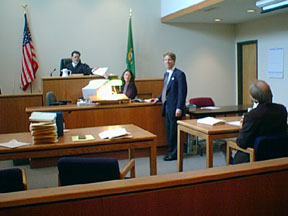The Narcissist In Court - Part 1

A clear distinction has to be made between the FACTUAL pillar and the PSYCHOLOGICAL pillar of any cross-examination or deposition of a Narcissist.
It is essential to be equipped with absolutely unequivocal, first rate, thoroughly authenticated and vouched for information. The reason is that narcissists are superhuman in their capacity to distort reality by offering highly "plausible" alternative scenarios which fit all the facts.
It is very easy to break a narcissist - even a well trained and prepared one.
Here are a few of the things the narcissist finds irresistible:
* Any statement or fact which seems to contradict his or her inflated perception of his grandiose self.
* Any criticism, disagreement, exposure of fake achievements, belittling of "talents and skills" which the narcissist fantasizes that he or she possesses, any hint that he or she is subordinated, subjugated, controlled, owned or dependent upon a third party.
* Any positioning of the narcissist as average and common, indistinguishable from many others.
* Any intimation that the narcissist is weak, needy, dependent, deficient, slow, not intelligent, naive, gullible, susceptible, not in the know, manipulated, or a victim.
* The narcissist is likely to react with rage to all these and, in an effort to re-establish his fantastic grandiosity, he is likely to expose facts and stratagems he or she had no conscious intention of exposing.
* The narcissist will also react with narcissistic rage, hatred, aggression, or violence to an infringement of what he perceives to be his or her entitlement.
* Narcissists believe that they are so unique and that their lives are so cosmically significant that others should defer to their needs and cater to their every whim without question. The narcissist feels entitled to special treatment by unique individuals, over and above the regular "bloke".
* ANY insinuation, hint, intimation, or direct declaration that the narcissist is not special at all, that he is average, common, not even sufficiently idiosyncratic to warrant a fleeting interest will inflame the narcissist.
ADD to this a negation of the narcissist's sense of entitlement - and the combustion is inevitable.
Tell the narcissist:
* that he or she does not deserve the best treatment,
* that his or her needs are not everyone elses priority,
* that he or she is boring,
* that his or her needs can be catered to by an average practitioner (medical doctor, accountant, lawyer, psychiatrist),
* that he or she and his motives are transparent and can be easily gauged,
* that he or she will do what he is told,
* that his or her temper tantrums will not be tolerated,
* that no special concessions will be made to accommodate his or her inflated sense of self, etc.
When approached in this manner, this will cause the narcissist to lose control the majority of the time.
Remember, the narcissist believes that he or she is the cleverest, far above the madding crowd. If contradicted, exposed, humiliated, berated ("you are not as intelligent as you think you are", "who is -really- behind all this? It takes sophistication which you don't seem to have", "so, you have no formal education", "you are (mistake his age, make him much older)... sorry, you are ...old" "what did you do in your life? did you study? do you have a degree? did you ever establish or run a business?" "would your children share your view that you are a good father?" "you were last seen with a Mrs. ... who is (suppressed grin) a DOMESTIC (in demeaning disbelief))", a narcissist will stand the chance of losing it.
I know that many of these questions cannot be asked outright in a court of law. But you CAN hurl these sentences at him during the breaks, inadvertently during the examination or during the deposition phase, etc.
Sam Vaknin

<< Home